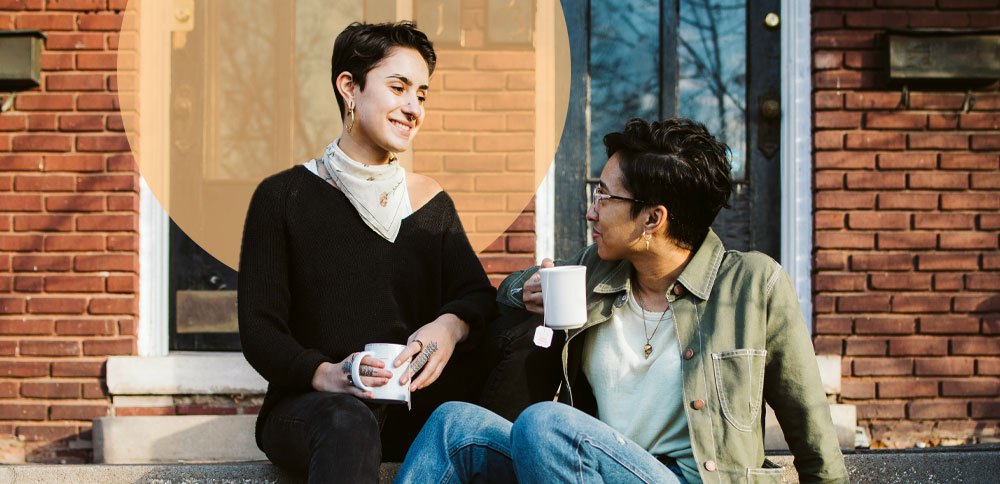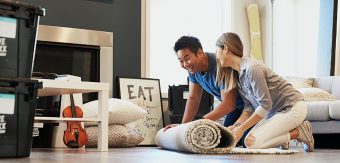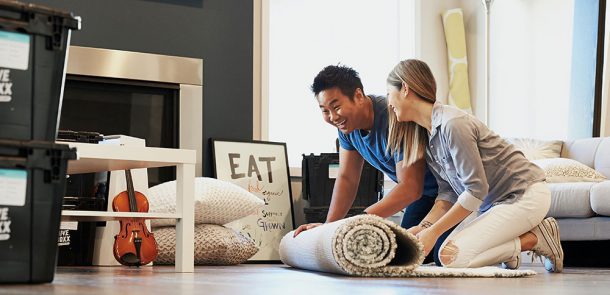This post was originally written by Kristen Hilderman and has been updated by Team Vancity on July 31, 2025, to reflect the latest market data and insights.
Buying your first home in BC isn’t for the faint of heart. According to the BC Real Estate Association’s most recent Q1 2025 report, the average home price in the province is forecasted to be $973,000. But don’t lose hope—home ownership is still within reach, especially with tools like the First Home Savings Account (FHSA) helping first-time buyers save more efficiently.
As a first-time home buyer, you get a few perks to make fighting your way into the housing market less painful. For instance, you don’t have to save a 20 per cent down payment. You can buy your first home with as little as five per cent down payment with a high-ratio insured mortgage. And with an FHSA in your corner, that number can feel a whole lot more doable.
So, if you want to turn your rent payments into equity in a place that’s all yours, read on to see how the FHSA can help you buy your first home.
The FHSA is different from the Home Buyers’ Plan.
The Home Buyer’s Plan (HBP) lets you take money out of your Registered Retirement Savings Plan (RRSP) to use towards the down payment on your first home without paying the taxes on it. But there’s a catch—you have to pay it back to your RRSP within 15 years. Essentially, you’re borrowing money from your future self.
The FHSA, on the other hand, lets first-time homebuyers save up to $40,000 for a down payment tax-free, without needing to pay it back later. So if you’re trying to save for a first-time down payment, you should open an FHSA account.
Also, unlike the Home Buyer’s Plan, the money you save and withdraw from an FHSA does not need to be repaid, making it the logical first place to invest your down-payment savings. If you’re already saving up with the Home Buyer’s Plan in an RRSP, your FHSA savings can be combined with this amount and used towards the same qualifying home.
When you contribute your money in an FHSA with Vancity, you’re also supporting the values you care about, such as financial inclusion, affordable-housing creation, green builders and local entrepreneurs.
What you need to know about FHSA.
Once you open an FHSA, your contribution room starts accumulating. That’s true even if you’re not ready to contribute right away. Whatever money you do put in grows tax-free, and you won’t pay tax when you withdraw it to buy your first home. No repayments, no strings attached.
You can contribute up to $8,000 per year, with a lifetime max of $40,000.
There’s no minimum holding period either. That means if you contribute this year, you could use it for a down payment immediately and still get the tax perks.
To open an FHSA, you need to:
- Be aged 18-71.
- Be saving to buy a qualifying home in Canada.
- Be a current tax resident of Canada.
- Have a valid Social Insurance Number (SIN).
- Meet the first-time home buyer conditions.
And here’s a fun loophole: Even if you’ve owned a home before, you might still qualify. If you (or your spouse) haven’t owned a home in the last four years, you’re considered a first-time buyer again.
A real-world scenario of using an FHSA.
Let’s put these hypothetical facts into a real-world perspective.
Jules wants to buy a house. She met with her financial advisor, who told her about the FHSA account. She’s determined to put in $670 a month, so she’ll hit just over $8,000 a year. In Jules’ ideal five-year plan, she’ll have saved $42,000 for a down payment, with $40,000 growing tax-free in her FHSA. Jules can put the extra money into a Tax-Free Savings Account (TFSA) or into her RRSP and withdraw it using the HBP later.
Jules is a little worried about making those max payments, though. Good news for Jules, she absolutely doesn’t need to max out the FHSA to benefit from it.
But Jules wants to know what happens if she can’t save as much. Will she still be able to buy a home in five years?
| Contribution amount | Down payment amount | Down payment amount Mortgage amount you could qualify for* |
| $250/month for 5 years | $15,000 | $300,000 |
| $400/month for 5 years | $24,000 | $480,000 |
| $700/month for 5 years | $24,000 | $650,000 |
In Vancouver, at least, it can be tough to find a place for under $500,000. So, Jules may want to supplement her FHSA savings with other savings, too.
Jules can use both an FHSA and an HBP to build her down payment. If she maxed them out, she could potentially have $100,000 for her down payment.
Jules can also take advantage of a TFSA and invest her savings to grow her money with compound interest.
None of Jules’ FHSA contributions, or any of the investment gains (should she invest it), are taxed. And, as long as she withdraws the funds for her home purchase, her withdrawal isn’t taxed either.
An FHSA is one of the only times the government isn’t going to make you pay your taxes.
What happens if the FHSA holder passes away?
We’ve talked about wills and estate planning before. Even for the young ones among us, it’s important to be prepared.
Anyone who opens an FHSA can name a successor holder. That way, in the event an FHSA account owner dies, their money will be given to a spouse or common-law partner (assuming they meet the eligibility requirements). However, contributions or transfers after the account holder’s death can’t be made.
The best time to start building your FHSA is now.
You can start saving now and keep your FHSA open for 15 years (or until you turn 71, whichever comes first).
If you don’t end up buying a home within those 15 years, it’s no problem. You can transfer the balance to your RRSP or Registered Retirement Income Fund (RRIF) without having to pay taxes on it. But, if you withdraw the funds from the FHSA, you’ll need to pay taxes on them.
You can open an FHSA at any Vancity branch, where your money will be invested in a Jumpstart HISA or term deposit. Another option is to work with a Vancity wealth advisor to invest the funds in the market and make your money work for you.
If you’re not yet a Vancity member, transferring your FHSA from another financial institution is as simple as completing a transfer form.
We can help you get to where you want to go.
When you decide to open an FHSA, we’ve got your back. Our team is here to help you figure out the best way to achieve your financial goals, including buying your first home.
The Ultimate Guide for First-Time Homebuyers in BC is a great place to start if you’re still figuring out what kind of down payment you need and the size of mortgage you can afford. From there, you’ll have a better idea of how much money you should be investing in an FHSA to reach your goal of owning your first home.
Learn more about investing in an FHSA, or talk to one of our wealth advisors at your local branch. It’s never too late to start saving, and the best time to start is now.
The information contained in this article was obtained from sources believed to be reliable; however, we cannot guarantee that it is accurate or complete. This article is provided as a general source of information and should not be considered personal investment advice or a solicitation to buy or sell any mutual funds and other securities.




